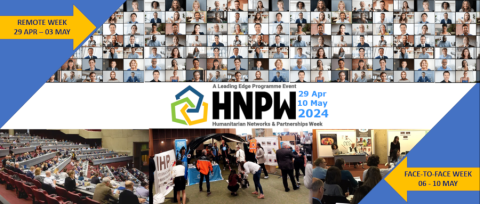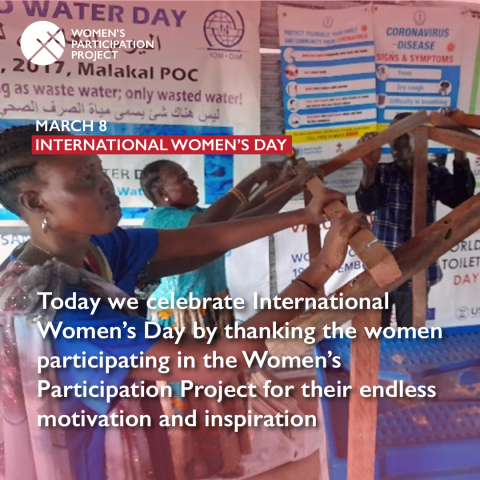Women lead the response to COVID-19 in Displacement Camps Around the World
The COVID-19 pandemic has impacted the living conditions and personal circumstances of the displaced persons living in camps and camp-like settings, which made it difficult to implement mitigation measures in many displacement settings. To respond to the most urgent needs of the pandemic, modalities and activities under the Women’s Participation Project were reoriented and adapted to ensure women and girls had access to the relevant information to prevent the spread of the virus in their communities and to promote an active role of women in the COVID-19 prevention and response activities.
One of the main activities implemented as a response to the pandemic was the training and production of non-medical facemasks, through consultations with women’s groups in four countries implementing the Women’s Participation Project: South Sudan, Nigeria, Somalia and Bangladesh. In Wau Protection of Civilian (PoC) site in South Sudan, 29 IDP women, including 11 women with disabilities were identified to participate and attend the trainings which covered hand and machine sewing. As a result, the masks produced by this group of women, together with the masks produced with the support of other organisations, covered the entire PoC population. This activity has been positively received by the women, with women commenting, “with the new skills I learned during the trainings, everybody around my house is reaching out to me to learn how these masks are produced which has given me more weight and value in my community and with the little money I get from selling the masks I am able to improve the small business that I am running at home.”
In Somalia, the facemask activities were implemented in Dollow, where the core group of internally displaced women who participated in the project were located. Once masks had been produced, the women’s group held a discussion with groups-at-risk in the camp where it was decided that the first batch of masks would be distributed to groups-at-risk in the site for free, while the subsequent batches were sold at the local market. One of the women who participated in the activity shared that, “the face mask creation training I received not only helped me participate in the community initiative to fight against COVID-19 in our IDP sites, but also helped me gain the skills I need to provide an income for my family. We are making masks to help people; children and the entire community, protect themselves from the COVID-19.”
With restrictions and lockdowns enforced by the Government of Bangladesh in response to the pandemic, the Women’s Committee in Cox’s Bazar, Bangladesh – which comprises more than 100 female Rohingya refugee and host community members – has been on the forefront of the COVID-19 preparedness and response in the camp. Having been trained on COVID-19 health and social measures messaging, the committee has been in the forefront of disseminating these key messages, reaching over 700 women and adolescent girls in their respective communities. The sessions conducted by the Women’s Committee with the community covered COVID-19 symptoms, prevention measures, management of symptoms, referral mechanisms in place, and how to manage rumours and stigmatization. In Somalia, IOM Camp Coordination and Camp Management (CCCM) teams supported IDP women’s groups on Risk Communication and Community Engagement (RCCE) which included development and adaptation of RCCE materials on the use of face masks. Moreover, IOM liaised with UNDP for the elaboration of awareness-raising videos to be used during RCCE activities developed in Somali language, covering the topics of non-medical mask making and proper use.
As religion plays a significant role in Somalia, mosques remained open despite the risks of COVID-19 transmission and lack of support to implement COVID-19 risk mitigation measures. To address this, IOM CCCM teams provided cleaning materials and 50 handwashing stations to IDP women, who identified the mosques to distribute the items and install the stations. Moreover, the women’s groups have been working closely with the community and imams (religious leaders) to raise awareness based on the RCCE training received, to mitigate the risk of COVID-19. In total, 200 mosques were supported in three locations: Baidoa, Kismayo and Dollow. The role of women’s groups in responding to COVID-19 has been positively viewed by the religious leaders, with one imam remarking, “This is not only meant for the women but is very essential and inclusive for all genders. It was an integrated approach that mean to prevent the spread of pandemic in the IDPs, thus IDP women’s groups helped us with cleaning materials meant to clean the mosques in the IDPs as the means of mitigation of COVID-19. We are very grateful for women's roles within the community in such crucial times.”
In addition to non-medical face mask making activities, Information, Education and Communication (IEC) materials were produced in Nigeria in five different local languages to enable ease with dissemination of COVID-19 key messages to communities. Moreover, the IOM CCCM teams conducted trainings for women’s committee members and camp sectoral committee members on self-care management during COVID-19, ensuring trainees replicated this to the camp population. Similarly, in Kersa IDP site in Ethiopia, a group of 12 women were trained on communication and leadership skills and in key messages on COVID-19 with the aim to empower and prepare the participants to lead the RCCE activities on COVID19. Furthermore, the participants were equipped with Personal Protective Equipment (PPE), to ensure that they could safely replicate the key messages in their community.
The Women’s Participation Project began in 2015 as part of the 'Safe from the Start' Initiative, managed by the Global Camp Coordination and Camp Management (CCCM) Support team at IOM HQ. With the objective to improve women’s participation and representation in displacement, mainstreaming prevention and mitigation of GBV in camp management operations, the Women's Participation Project has been implemented in 9 countries in the last five years including Ecuador, Bangladesh, South Sudan, Somalia and Nigeria.
To find out more on the Women’s Participation Project, visit the Women in Displacement Platform.
This article was written by Ashereen Kanesan, IOM Global CCCM Support Consultant for the Department of Operations and Emergencies.


